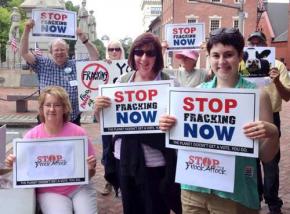Fracked up democracy
reports from Pittsburgh on a fight to prevent fracking in Deer Lakes Park.
ON THE evening of May 6, dozens of activists gathered at a meeting of the County Council of Allegheny County in Pittsburgh.
Despite the fact that it was a weeknight, these activists from Protect Our Parks (POP), South Hills Area Against Dangerous Drilling (SHAADD) and Marcellus Protest stayed until 12:30 a.m. to register their opposition to an ordinance introduced by Rich Fitzgerald, the county executive of Allegheny County (and a close friend of the gas corporations like Range Resources), to allow a lease of oil and gas rights at Deer Lakes Park, a county-owned park northeast of Pittsburgh. The lease will pave the way for oil company Range Resources to drill for Marcellus shale.
The activists who turned out to the meeting have been working tirelessly to stop hydraulic fracturing, or "fracking," and the exploitation of the land by corporate interests. However, the Council seemed to be interested in what these activists had to say only when council members were personally challenged by those speaking.

As Marcellus Protest notes on its website, the gas industry claims that fracking is perfectly safe and contributes to the economy, but numerous spills, contamination and blow outs already have been documented across the country, and "14 waste disposal facilities along the [local] Monongahela Watershed are accepting chemically contaminated 'frack' water, diluting it and dumping it directly into our rivers."
As for claims about promoting job growth, the Marcellus Protest notes that few of the supposed new jobs are likely to go to Pennsylvanians--but it will be left to local communities to clean up the fracking aftermath. "We've seen this before with coal mining and heavy industry," the group notes. "The long-term effect is boom then bust, with a legacy of environmental destruction that compromises the region's quality of life and economic potential for future generations. And somehow, the folks who profit from it are never around to clean it up."
After more than five house of citizens' comments overwhelmingly against allowing drilling in one of Allegheny County's great parks--a park that is supposed to be set aside for the people--the Council quickly voted in favor of allowing drilling at Deer Lakes Park by a vote of 9-5.
IT SEEMED as if this meeting, and similar previous meetings, were just a show for the Council to pretend like the public had a voice in the decision. Democracy, however, lost out to unfettered capitalism and contempt toward our planet. After the vote, many of those in the audience shouted "shame" at the council members who had voted in favor.
In the end, those voting in favor of allowing fracking were nine white men, while those who voted against included four women and one African American council member. One council member abstained from voting because of her family ties to the gas industry.
Environmental activists and those dedicated to the sustainability of the planet came to every Council meeting for months leading up to this vote--only to have the end result essentially predetermined by the gas corporations and their political spokespeople. Especially troubling is that the conditions of the lease could change even after this vote, leaving citizens to wonder what kinds of conditions might end up in the final document.
All of this became apparent once the vote came down. Men and women who had fought so hard to stop the continuing destruction of the Pittsburgh area by the fossil-fuel industry erupted in anger at their "elected representatives."
The environmental movement, in particular the anti-fracking movement, is at a crossroads. Fighting the gas industry from drilling on public lands is the hottest environmental issue in Pittsburgh at the moment.
After this vote, hard questions are being asked: Do we continue to appeal to the politicians in the corporations' pockets, or do we become galvanized by our struggle and fight in other ways? Is civil disobedience the next step? Should we occupy a drilling site? Can we continue to build a coalition of the radical, environmental left with grassroots organizations like POP and Marcellus Protest? We also need to ask how we can build a bridge between our racially segregated communities to fight this battle together. And, how can we get the labor movement involved?
The labor movement, with its training resources and structure, could be a natural ally with the anti-fracking movement and help build the fight against the corporatization of public lands. Unfortunately, unions like the Service Employees International Union, the United Brotherhood of Carpenters and the United Steelworkers actually support the drilling because of the promise of jobs. Environmental activists will need to work to bring unions on board the anti-fracking fight.
These questions must be put at the heart of our struggle against fracking going forward--and the larger struggle against the system that allows the destruction of our planet for profit.


